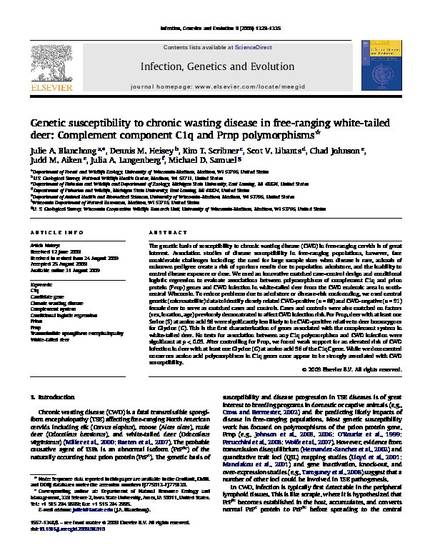
The genetic basis of susceptibility to chronic wasting disease (CWD) in free-ranging cervids is of great interest. Association studies of disease susceptibility in free-ranging populations, however, face considerable challenges including: the need for large sample sizes when disease is rare, animals of unknown pedigree create a risk of spurious results due to population admixture, and the inability to control disease exposure or dose. We used an innovative matched case–control design and conditional logistic regression to evaluate associations between polymorphisms of complement C1q and prion protein (Prnp) genes and CWD infection in white-tailed deer from the CWD endemic area in southcentral Wisconsin. To reduce problems due to admixture or disease-risk confounding, we used neutral genetic (microsatellite) data to identify closely related CWD-positive (n = 68) and CWD-negative (n = 91) female deer to serve as matched cases and controls. Cases and controls were also matched on factors (sex, location, age) previously demonstrated to affect CWD infection risk. For Prnp, deer with at least one Serine (S) at amino acid 96 were significantly less likely to be CWD-positive relative to deer homozygous for Glycine (G). This is the first characterization of genes associated with the complement system in white-tailed deer. No tests for association between any C1q polymorphism and CWD infection were significant at p < 0.05. After controlling for Prnp, we found weak support for an elevated risk of CWD infection in deer with at least one Glycine (G) at amino acid 56 of the C1qC gene. While we documented numerous amino acid polymorphisms in C1q genes none appear to be strongly associated with CWD susceptibility.
Available at: http://works.bepress.com/julie_blanchong/3/

This article is from Infection, Genetics and Evolution 9 (2009): 1329, doi:10.1016/j.meegid.2009.08.010.